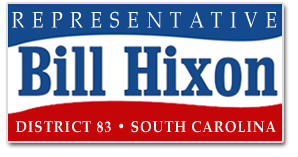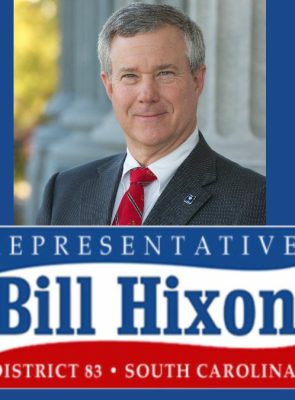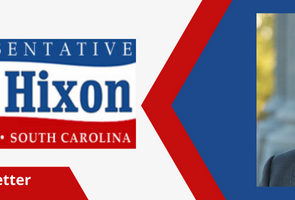Dear Friends,

Congratulations to all the Graduation Classes of 2013! Now that you have graduated you need to prepare yourselves for the new challenges waiting for you in the new chapter of your life. May God bless you, keep you safe and give you the courage to thrive towards your dreams.
The General Assembly's regular session for 2013 came to an end last Thursday at 5 p.m. Critical legislation was left unfinished and will be on our agenda for the second part of our two year session. When we started in January I was extremely optimistic of what we would be able to accomplish this year, with all the new senators eager to get things done in the Senate. Even though some of those hopes were not accomplished, we worked hard to move a lot of important legislation forward.
In order for me to have a strong voice in Columbia, I have to communicate with my constituents. And that is you! My website, newsletters, mailers and Facebook are the communication tools that I use. It takes extra time, staff and campaign funds to maintain these tools.
If you would like to contribute, please mail a check to Hixon For House, P.O. Box 7927, North Augusta, SC 29861 or contribute online by going HERE.
I hope that you find this update helpful and informative:
LEGISLATIVE UPDATE – June 14, 2013
This newsletter has a lot of information about the 2013 End of Session; however, we will go back to tie up some loose ends again next week and some of this information may change.
Business Freedom to Choose Act
Legislation H.3290 encourages counties to pursue a regional approach to solid waste management. This purpose of this bill is to prevent counties from enacting ordinances, like the one enacted in Horry County in 2009, to require all solid waste generators including private companies to dispose of their waste at county-owned landfills. I support his legislation to address this issue on a state level because I believe it is wrong to allow a county to force private companies to use a government-owned facility if there are more competitive options available in the market. It is wrong for a county to be a competitor in the market and then use its powers to driver other competitors out of the market altogether. To view my editorial that appeared in the Aiken Standard on May 31, click here.
Election Reform
Passed by both the House and the Senate, H.3298 is awaiting signature by the Governor. This legislation addresses the filing conflicts that spawned last year's ballot controversies. This bill removes the filing of a statement of economic interests from election law requirements and makes such filings an ethics law matter, exclusively, for both new candidates and incumbents. The procedures for becoming a candidate were also completely revised by the legislation so that the involvement of political party officials is no longer required, and all necessary filings, attestations, and payment of fees are conducted through governmental offices. It also revises the rules parties follow to nominate candidates by convention.
Early Voting
Legislation H.3176 creates the state's first official early voting period for nine days before the election, excluding Sundays. Each county must establish one early voting center which must be supervised by election commission employees and located in a public building within the county seat or another location that is as centrally located for the entire county as possible. This legislation requires elections only be conducted on one of the four following days: (1) the second Tuesday in March; (2) the second Tuesday in June; (3) the second Tuesday in September; or (4) the Tuesday after the first Monday in November. Also, this legislation ends the practice of fusion voting. Fusion voting is where two or more political parties on a ballot list the same candidate, pooling the votes for that candidate. This legislation was passed by the House and is awaiting action in the Senate Judiciary.
Ethics Reform
Legislation H.3945, Ethics reform, was passed by the House and is on the Senate calendar. The legislation:
-
Abolishes the House and Senate ethics committees and replaces them with a new, bi-partisan committee that includes public officials and members of the general public.
- Creates a "Public Integrity Unit" to investigate criminal complaints.
- Prohibits contributions to public officials from "Leadership PACs".
- Requires all lawmakers to disclose all sources of income — public and private.
- Requires lobbyists to register if they lobby local governments or school districts, but keeps all exemptions for members of the public and local organizations such as PTA's, homeowner's associations, or churches.
- Strengthens criminal penalties for violations of the Ethics Act.
- Eliminates the "blackout period" right before an election when candidates do not have to disclose donors.
- Expands when a public official must recuse himself from a vote to include all levels of the legislative process down to the subcommittee level.
Obamacare Nullification
Passed by the House, H.3101, Affordable Care Act nullifcation, was placed on the Senate calendar. This legislation prohibits enforcement of Obamacare in South Carolina and declares that the General Assembly has the sovereign authority to refuse to enforce the provisions this federal health care legislation because its scope exceeds the powers delegated to the federal government under the United States Constitution.
State Health Care Freedom Act
This bill, H.3096, provides that the state of South Carolina must not elect to establish or operate Obamacare health insurance exchanges, but must not establish a governmental agency or nonprofit entity to operate an American Health Benefit Exchange, and must not participate in a regional exchange as provided for in Obamacare. This legislation was passed by the House and is in the Senate Banking Committee.
Automobile Sales Tax Directed to Roads
Passed by the House and the Senate Finance Committee, legislation H.3412 is awaiting action from the full Senate. This legislation redirects the sales tax on automobiles to the Department of Transportation to fund highway maintenance, representing $82.8 million each year. Motor vehicle sales tax revenues that fund the Education Improvement Act are not redirected.
 Boeing Expansion
Boeing Expansion
The House legislation, S.578, authorizing the issuance of up to $120 million in economic development bonds to assist infrastructure improvements to aid an expansion of the Boeing plan in North Charleston was signed by Governor Haley. This bill authorizes up to $120 million in bonds for the expansion, bringing an additional investment of at least $400 million and at least 400 new jobs, and for an enhanced economic project with an investment of at least $1.1 billion and creating at least 2000 new jobs.
Small Business Access to Growth Act
Both the House and Senate approved H.3505, legislation formerly known as the "Bill Wylie Angel Investment Act", it is awaiting signature by the governor. This legislation establishes nonrefundable income tax credits to encourage "angel investors: providing early stage capital for emerging high-growth enterprises in such areas as manufacturing, processing, warehousing, wholesaling, software development, and information technology services.
Electronic Automobile Insurance Verification
Passed by the House, H.3623 is in the Senate Transportation Committee. This legislation allows drivers to show proof of insurance on a mobile device. If an insurer chooses to provide verification in an electronic format, the insured may display this electronic proof of automobile insurance coverage on a smartphone or other mobile electronic device in order to provide a law enforcement officer with evidence that satisfies the financial responsibility requirements established for drivers under state law.
Session Shortening
For the 10th time since 1994, the House approved a constitutional amendment shortening the legislation session. This amendment, H.3340, requires the legislation session to begin one month later each year and end one month earlier — beginning on the second Tuesday in February and ending on the first Thursday in May. The amendment also authorizes the House and Senate to hold committee meetings and conduct hearings in January. This amendment is awaiting action in the Senate Judiciary Committee.
Governor Appointment of Adjutant General
The House approved a joint resolution making the Adjutant General appointed by the Governor. The Senate approved the legislation but constitutional amendments are still on the Senate calendar. H.3540/H.3541 also establishes provisions relating to: the duties of the office; the minimum command experience, South Carolina National Guard service requirements, and other qualifications for the office; the procedures by which the appointment is made; and, the procedures by which the Adjutant General may be removed from office by the Governor only for certain reasons constituting cause. This will now be on the ballot for approval in November 2014.
Handgun-Background Check for Mental Health Issues
The House overwhelmingly approved a bi-partisan measure to add people who have been deemed mentally unstable by a judge to the federal gun background check registry. This follows the incident in February where a woman who had been indicted of a threat to kill President George W. Bush went to Charleston's Ashley Hall school and attempted to shoot people. The gun did not fire because it was not properly loaded. Our state narrowly avoided a terrible tragedy. Legislation H.3560 was signed by Governor Haley.
Legal Tender/Coins
The House approved H.3504, legislation providing that gold and silver coins minted foreign or domestic shall be legal tender in South Carolina. The legislation further provides that no person or entity may compel another person or other entity to tender or accept gold or silver coin unless agreed upon by the parties. This legislation is awaiting action in the Senate Finance Committee.
Samples and Sales of Beer at Breweries
The House approved legislation H.3554 that will allow breweries to offer on-premises consumption in conjunction with tours. It sets limits of the alcohol content of the beer and the amount a single consumer can consume in 24 hours. This legislation was signed by Governor Haley on June 6, 2013.
Property Tax Classification for Active Duty Military
Legislation H.3027 provides that an active duty member of the Armed Forces of the United States who receives the special assessment ratio for owner-occupied residential property retains this four percent assessment ratio as long as the owner remains active duty, regardless of the owner's change of duty station and regardless of any rental income attributable to the property. This legislation was passed by the House and is awaiting action in the Senate Finance Committee.
Conversion of Private School to Public School
This legislation H.3472, is enrolled for ratification and allows private schools to convert to public charter schools without having to dissolve and close for a period of twelve months, as long as the private school's student population reflects the racial composition of the local school district. Private schools that successfully convert to charter schools will be held to the same requirements as all other charter schools.
Accountability-based Funding for Colleges and Universities
The House approved a joint resolution requiring performance-based funding recommendations for public colleges and universities.This legislation H.3518 directs the CHE, in collaboration with the college presidents, to make recommendations on a funding method featuring specified evaluation criteria emphasizing accountability, performance, and outcomes to ensure that public institutions of higher learning receive financial support from the state based upon the quality and effectiveness of the services they provide. This legislation is in the Senate Education Committee.
 In-State Tuition for Military Dependents
In-State Tuition for Military Dependents
The House expanded in-state tuition eligibility for veterans and their dependents with H.3086. Veterans and their dependents would be entitled to receive in-state tuition rates and fees at state institutions without the requirement of one year of physical presence in this state. This legislation passed by the House and is in the Senate Education Committee.
Exit Exams
The House approved a bill, H.3919 that provides for the elimination of the high school exit exam as a requirement for graduation. Additionally, the legislation creates a study committee to consider whether the exit exam should remain the accountability assessment used by the state and to recommend an alternative, if necessary. The committee is to make a report to the General Assembly no later than January 31, 2014. This bill is currently in the Senate Education Committee.
Please be sure to stay up to date with all that is going on in Columbia. If you have an questions, comments or concerns, I am always available.



